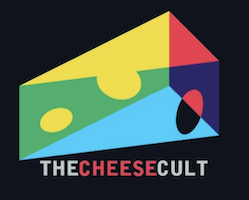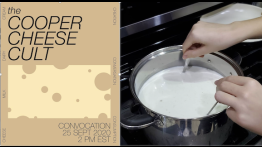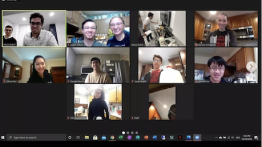Cult Following
POSTED ON: November 18, 2020
At Cooper, courses and public programs have been adapted to the online universe, but the nature of keeping safe during a pandemic has left little opportunity for students to simply relax and socialize. Electrical engineering sophomore Moses Bakst sees this as a challenge regardless of quarantining restrictions.

“Yes, we have extracurricular activities, but they’re hardly a good place to just calm down and have a good time,” he says. With heavy academic schedules and ambitious goals, Moses believes many tend to want to make the most of even their free time by joining clubs that build skills. And the pandemic has only exacerbated the chance to cut loose.
As a representative for the Engineering Student Council, Moses has taken part in a few group conversations on the issue and he set out to form a club that would be just for fun. But how to get Cooper students to join? The solution, Moses decided, was cheese. It’s a (mostly) uncontroversial subject, nonpartisan, virus-free, and delicious. And better yet, he could draw in members not by promising a fun social hour eating camembert, but by providing a new skill: cheese making. With that the Cheese Cult was born.
The idea was simple: distribute identical cheese-making kits to club members and lead virtual workshops so everyone could make the cheese “together.” It didn’t matter if it was Escoffier quality, the point was for people to have some fun making something delicious. To give the club its own brand identity, Logan Villano ME ‘23 transformed the Cooper Union box kite logo into a wedge of Cooper-colored cheese, and Randel Placino ME ’24 put together some minimalist cheese–themed event flyers. Anastasiya Islamova ChE ’23 and Gila Rosenzweig CE ’24 were a big part in planning the logistics of the event, making spreadsheets, organizing orders, and making sure even the lactose-intolerant were included with an option to make fully vegan cheese.
Partnering with a farmer named Paula Butler, located just outside of Nashville, Moses and his fellow cultists purchased cheesemaking kits and shipped them to any Cooper student interested in participating. In nine cases, Moses even hand delivered the kits. “I’ll do anything I can to make the event as inclusive and enjoyable as possible” he said. The kits, which were bought with Joint Activities Committee funds, were greatly discounted when Ms. Butler learned that the club planned to buy 39 kits—the number of people who signed up for the workshop within four days of its announcement.
Within a month, the club became the most popular on the new JAC website, the hub for student activities at Cooper. 29 people took part in the first workshop, split up into two consecutive sessions due to the volume of attendees—most ending up with a better than passable mozzarella. After finals, the Cheese Cult may offer another workshop—this one for making halloumi cheese, a cheese which Ms. Butler strongly recommended over a phone call with Moses—and even some talks on cheese-related topics. The first, says Moses, may tackle the fascinating story of how the U.S. government came to have 1.5 billion pounds of cheese hidden in spots around the country. A cheese club with history lectures? It is, after all, a Cooper Union club.






